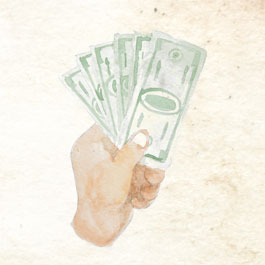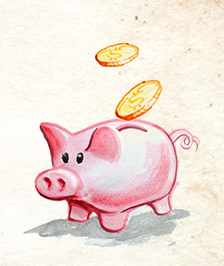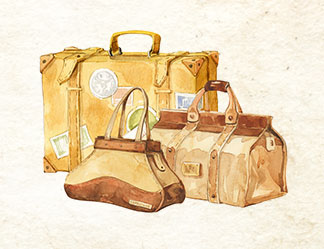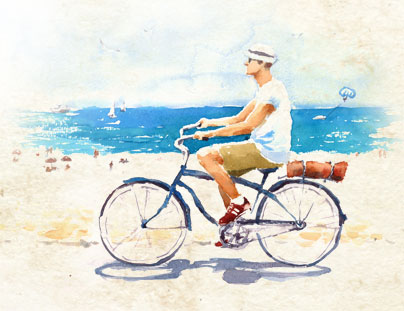- Cover
- Research
- Budgeting
- Saving
- Transport
- Accommodation
- Food
- Packing
- Solo travel
- Couple travel
- Family travel
- Short stay
- Long stay
- Permanent
Do your research

A lot of people spend unnecessary money while traveling just because they haven’t taken the time to conduct research. Start by researching things might save you money while you’re away, including:
- Taking out a credit card that doesn’t impose foreign transaction charges.
- Buying a spare mobile phone and investing in a local sim card. This will save you a fortune on local calls.
- Make sure you know exactly how much you will be paying for things like hotel rooms and car hire. It’s easy to be stung by hidden costs like collision damage waiver or service charges.
- Consider other things that might save you money depending on where you are going. For example, if traveling to a place where it’s not safe to drink the tap water, take metal water bottles with you so you can boil water to ensure it’s safe to drink, saving you money on mineral water.

Do your research
Choose a cheaper destination
If you want to make your travel last, remember that you can spend much longer in destinations that don’t cost as much.

- Large, fashionable, international cities are usually more expensive to visit than smaller ones (compare Hong Kong to Thailand’s Chiang Mai for example).
- Beautiful countries that are still struggling to overcome the stigma of relatively recent wars (Bosnia, Croatia, Cambodia, Vietnam) often offer good value.

Create a budget

This should start before you leave home. Once you’ve fixed on where you want to go and how much it will cost you get there, research a realistic daily budget for accommodation, food, transport and entertainment.
- Don’t forget to include pre-trip costs like insurance, visas, vaccinations and any gear like backpacks that you might need.
- Put some money aside for emergencies, and be sure to budget for flexibility. You want to be able to enjoy yourself while you’re away, and not just think about how much you’re spending all the time.
- Consider how you’ll be traveling - are you going to stay in hotels or hostels? Can you look for cheaper transport options? Be realistic about how much these things will cost you.
- There are some great online budget planners to help you. A tool like Mint can also help you countdown towards your savings goal and suggest ways to cut expenses.
- When you’re on the road, it’s a good idea to keep a spreadsheet of what you are spending on a daily basis to avoid any nasty shocks half way through the trip.
Save up

Once you've created a budget and figured out how much you need, then you've got a figure you can save towards. Some people put this number on their fridge or as a post-it on their computer, to provide motivation to work towards the goal. A few simple modifications can really add up when you’re saving to travel.
- If traveling is your priority, make sure you act like it. That means saying ‘no’ to your morning coffee or a night on the town, as well as cutting larger expenses and anything that isn’t essential to your livelihood.
- Just like making a daily budget for your travel, use a budget to ensure you aren’t spending wastefully in the lead up to your trip. Write down all the purchases you make - this will help you be more mindful of how many unnecessary things you are spending money on.
- Make a list of all your bills and think about how you can reduce them. This might mean limiting the hours you use your home’s central heating or air conditioning, hanging your clothes out on a line rather than using a dryer and shopping around for cheaper home insurance.
- Can you reduce your accommodation costs by moving to a less expensive apartment? Or perhaps you have a spare room that you could rent out for extra income?

Save up
- Try to pay off credit card bills and loans, thereby reducing the interest you are charged.
- Sell your car and use public transport.
- Reduce your weekly food bill by making a weekly eating plan and cutting down on waste. Take a packed lunch to work and cut down on eating out and drinking alcohol. Think about growing your own vegetables if you have a garden. For more tips on saving money on food, check out this guide.
- Borrow books from the library and read newspapers online. Rather than going to the cinema, explore free local museums and historical attractions.
- Give up expensive pay TV subscriptions.
- Cancel your gym membership and take up running instead.
- Learn to live on less. Trawl through second hand clothes shops and limit yourself to shopping during the sales.
- Use ‘free cycling’ sites to swap household items.
- Reduce storage costs. Do you have items sitting in an expensive unit? Why not sell them? This will both make and save you money.
- Get a second job, even for a short time. Think of it as investing in your time traveling.

Saving on transport

The key to saving money on transport is research, research, research. The Internet is your friend. Often traveling by rail and sea will be cheaper than flying, but it’s not always the case, so do check out your options. Similarly, return trips can sometimes be cheaper than one way. If it’s going to take you a long time to get to your destination, consider traveling overnight some of the way to save time, as well as saving money on accommodation. These types of off-peak trips are also usually much cheaper.
Traveling by air
- We’ve all done it - used one of the big online search engines to book flights and then found cheaper ones on offer. Try using an a site like Which Budget that checks budget airlines and seats on charter flights in addition to scheduled airlines.
- Create flight alerts so you can keep an eye out for cheap deals.
- Some cities have at least two different airports, traveling to and from one may be cheaper than the other, so do your research.

Saving on transport
- Beware of hidden charges. These days, it’s not only budget airlines that charge for baggage, onboard meals and seating preferences.
- Don’t forget to sign up to as many frequent flyer programmes as possible. Miles will save you money in the future.
- Flying mid-week is usually cheapest, and you should buy your ticket at least seven days in advance for the best fares.
Traveling by rail and sea

- Check if there are rail passes available for the country you are visiting. Fares are usually cheaper if you travel outside peak commuter times.
- Many ferry companies offer family packages of car plus two adults and two children for a fixed price.


Saving on transport

Cars
- Linking up with other travellers to share the expense of your commute is becoming increasingly widespread through sites like Car Pooling. You can post a travel plan and the number of places available in your car, or contact others who have offered spaces.
- Driving somebody else's car to a given destination is very popular in countries like Canada and North America because of the big distances people have to travel across the country.
When you’re in a new place
Transport costs do not only include getting between your destinations. Consider how you can save money on transport while you’re in a new place too.
- Ditch taxis and even public transport, and opt to walk everywhere. Not only does this save you lots of money, it’s also the best way to see a new city.

Saving on accommodation

After your transportation costs, accommodation is likely to be your next biggest expense.
Hotels
- Websites like hotels.com are a great way to check out which rooms are available at what price in the country you are visiting. One benefit of booking through them is that you usually pay in your local currency and all charges are included in the price.
- Make sure that you are aware of the hotel’s cancellation policy in case your plans change unexpectedly.
Hostels and guesthouses
- Hostels no longer only offer stark single sex dormitories – though they are the cheapest option. Many now have comfortable private en-suite rooms and family suites, to cater to all kinds of budget travellers. They also often offer cheap dinners and drinks, to help you save more money once you get there. Research what you can get for free at the hostel before choosing which one to stay out.

Saving on accommodation

- Guesthouses, often known as ‘bed and breakfast’ accommodation provide a homely, relaxed environment and are often run by people who are excellent sources of local information.
Apartments
- AirBnB has transformed the market of self-catering accommodation, allowing owners to advertise directly to customers. Stayz is another popular site.
- Hospitality exchange sites like Couchsurfing enable you to be a guest in somebody’s home free of charge for a few days. This is probably better suited to single travellers and couples than to families.


Saving on accommodation

- House sitting for owners whilst they are on vacation via companies like Trusted Housesitters is another great way to receive free accommodation, although you will need to pay a fee to post your details online and provide references. You will also be expected to leave the place spotless and may be required to look after pets.
Staying with friends
- Spending some vacation time with people you know is another great way to cut down on accommodation costs. Don’t be afraid to get in touch with long lost friends, friends of friends, Facebook friends… anyone you may know in a city. Most of the time they will be happy to host you. Just make sure you don’t overstay your welcome, and do remember to make your gratitude felt.

Saving on food

- Set a food budget for your trip. You might decide that you want to balance some frugal days with a blowout once a week. After all, experiencing the food in a destination can be one of the most exciting parts of traveling.
- Look for set price offers, two for one meal deals and places where kids can eat for free. These are usually more of these available at lunch than at dinner.
- Become a local. Avoid touristy restaurants in the most popular streets and squares, and choose the daily specials. Shop at markets offering seasonal produce.
- Choose hostels or apartments where you can self-cater, and eat in as much as possible.
- Avoid hotel breakfasts (unless they are included) as you can usually get better value at a nearby café. But if you score an included hotel breakfast buffet, don’t be afraid to take some fruit and muffins for snacking later in the day.
Packing considerations

A lot will depend on whether you are traveling with children and need necessities like pushchairs, sterilisers and travel cots. But the basic rule of thumb is – take as little as possible and definitely keep within your baggage allowance. Excess baggage charges can be scary.
- Plan ahead. If you’re staying a hotel, can they provide a cot in your room? If you’re hiring a car, can they include a child seat? Even if you have to hire these, it may work out cheaper and more convenient in the long run.
- If you’re traveling to all but the most remote of locations, it’s usually more cost effective to purchase items like toiletries and extra socks locally than paying extra charges to bring them with you from home.
- Think about the climate; only take the clothes you really need. Experienced travellers tend to think in threes for items like socks and t-shirts. This means you can follow the ‘wear one, wash one, dry one’ principle that should keep you in clean clothes, even if you have to wash them yourself in a hand basin.
- Travel with a small bag that you can carry easily. The bigger the bag, the more likely that your packing will ‘expand’ to fill it.
Solo travel on a budget

Single supplement charges and the scarcity of single rooms are often the scourge of solo travellers.
- Think about staying a hostel, where you might also meet fellow travellers with whom you can share meals and transportation.
- Universities and colleges often offer rooms in their residences during student breaks. These are usually near good transport links.
Traveling cheap as a couple

One of the biggest issues couples have to face is whether to pool funds or retain individual budgets, enabling each person to pursue their own interests without feeling guilty. Have this discussion before you leave home; it might prevent arguments and bad feelings on the road.
- Have a beer, or glass of wine, in your room before you head out for the evening. Restaurants put a huge ‘markup’ on alcohol so avoiding it with your meal will cut costs.
- Think about sharing food – perhaps ordering one entrée and two side salads. In some countries, like the United States, food portions are huge and can be easily enough for a couple.
Family travel on a budget

- Involve the whole family in setting the budget before you leave and reward kids for coming up with money saving tips.
- Start a ‘vacation bank’ at home, depositing coins in a pot throughout the year. It’s amazing how quickly this builds up.
- Although traveling with children under two years old can be hard work, it’s often the cheapest way to have a holiday with kids, as you won’t need to pay for a plane seat for them and they can usually sleep in hotel rooms free or for a very small extra charge.
Short stay travel on a budget

- Careful planning is key to short stay holidays, as charges for cultural attractions can be higher at weekends.
- Hotels and travel companies often offer great deals on rooms and plane seats shortly before departure.
- To get to know a city quickly, take a free walking tour. Also research when entrance to museums and other attractions are free.
Travel at the right time
When you travel can have a huge impact on your budget.
- If you can, it’s usually cheaper to travel outside school holiday periods.
- Monitor currency exchange rates carefully and try to select places that offer the best value for the Australian dollar.
- Enjoy countries out of season, i.e. avoid summer and Christmas and New Year periods. Not only will accommodation be better value but places are likely to be less crowded too.
Long stay travel on a budget

Working abroad is an ideal way to earn some money and/or receive free accommodation, which will drastically cut your costs. It may also help you get a long-stay visa for certain countries.
- Volunteer. There are many organisations that need volunteer help for long and short periods. WWOOFing or ‘Willing Work on Organic Farms’ is popular. But there are a whole host of other options, including seasonal work like waitressing during busy holiday months. Try searching websites like Working Abroad for the country you wish to visit.
- Working Visas. If you are under the age of 30, you can get a visa to work in many countries ranging from Canada to Hong Kong. This opens up a huge range of possibilities. Travel to a place that has a low unemployment for the best range of opportunities.
- Work online. If your skills allow you to run a business via your computer you will be able to work from most parts of the world.
- Teach English as a second language. This is a tried and tested method for finding work overseas, especially in countries like Thailand and China where tutors are in high demand.
- Crew on sailboats. This is not just for deckhands and good sailors. Luxury yachts often advertise for a whole range of professions from waitresses to beauticians, and travel is a huge part of the job.
Permanent travel on a budget

Been bitten by the travel bug and want to keep going for the rest of your life? Or perhaps you’ve fallen in love with that ‘one place’ you want to live forever?
- Before you sell your house and possessions in Australia, consider if you will ever want to return. If you do, you might find yourself priced out of the market. Consider renting your place out initially - this will also supply you with an income.
- Reach out to other expats who have been living in the country for a long time. There might be other issues they have encountered that you’re not aware of. Joining expat social groups and online sites is a good way to meet fellow travellers.
- What are the visa requirements for the country in which you plan to live? Is it actually possible to live there permanently as an expat?
- Check out medical provision and whether you will need comprehensive insurance in case you fall ill.
- Wherever you choose to go, for whatever period of time, remember that this is your personal experience. Do your research, listen to what other people say but don’t be afraid to follow your own instincts and dreams.